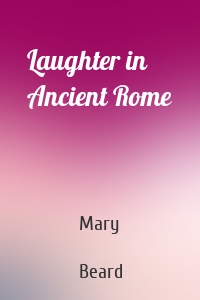Серия "Sather Classical Lectures"
9 кн.Скачать лучшие книги серии Sather Classical Lectures - автор Denis Feeney в формате fb2 или читать онлайн, бесплатно и без регистрации. Читаемые, полные версии книг, без сокращений - на сайте Knigism.online. Скачать книги полностью в количестве 9 шт.
Everyday Writing in the Graeco-Roma...
Most of the everyday writing from the ancient world—that is, informal writing not intended for a long life or wide public distribution—has perished. Reinterpreting the silences and blanks of the historical record, leading papyrologist Roger S. Bagnall convincingly argues that ordinary people—from Britain to Egypt to Afghanistan—used writing in their daily lives far more extensively than has been recognized. Marshalling new and little-known evidence, including remarkable graffiti recently...
| Автор | Roger S. Bagnall |
A Free Will
Where does the notion of free will come from? How and when did it develop, and what did that development involve? In Michael Frede's radically new account of the history of this idea, the notion of a free will emerged from powerful assumptions about the relation between divine providence, correctness of individual choice, and self-enslavement due to incorrect choice. Anchoring his discussion in Stoicism, Frede begins with Aristotle–who, he argues, had no notion of a free will–and ends with...
| Автор | Michael Frede |
Visual Power in Ancient Greece and...
Visual culture was an essential part of ancient social, religious, and political life. Appearance and experience of beings and things was of paramount importance. In <I>Visual Power in Ancient Greece and Rome</I>, Tonio Hölscher explores the fundamental phenomena of Greek and Roman visual culture and their enormous impact on the ancient world, considering memory over time, personal appearance, conceptualization and representation of reality, and significant decoration as...
| Автор | Tonio Holscher |
Greek Gods Abroad
From even before the time of Alexander the Great, the Greek gods spread throughout the Mediterranean, carried by settlers and largely adopted by the indigenous populations. By the third century b.c., gods bearing Greek names were worshipped everywhere from Spain to Afghanistan, with the resulting religious systems a variable blend of Greek and indigenous elements. <I>Greek Gods Abroad</I> examines the interaction between Greek religion and the cultures of the...
| Автор | Robert B. Parker |
Laughter in Ancient Rome
What made the Romans laugh? Was ancient Rome a carnival, filled with practical jokes and hearty chuckles? Or was it a carefully regulated culture in which the uncontrollable excess of laughter was a force to fear—a world of wit, irony, and knowing smiles? How did Romans make sense of laughter? What role did it play in the world of the law courts, the imperial palace, or the spectacles of the arena?<br> <br> <i>Laughter in Ancient Rome</i> explores one of the most...
| Автор | Mary Beard |
Classicism and Christianity in Late...
After centuries of near silence, Latin poetry underwent a renaissance in the late fourth and fifth centuries CE evidenced in the works of key figures such as Ausonius, Claudian, Prudentius, and Paulinus of Nola. This period of resurgence marked a milestone in the reception of the classics of late Republican and early imperial poetry. In <I>Classicism and Christianity in Late Antique Latin Poetry,</I> Philip Hardie explores the ways in which poets writing on...
| Автор | Prof. Philip Hardie |










